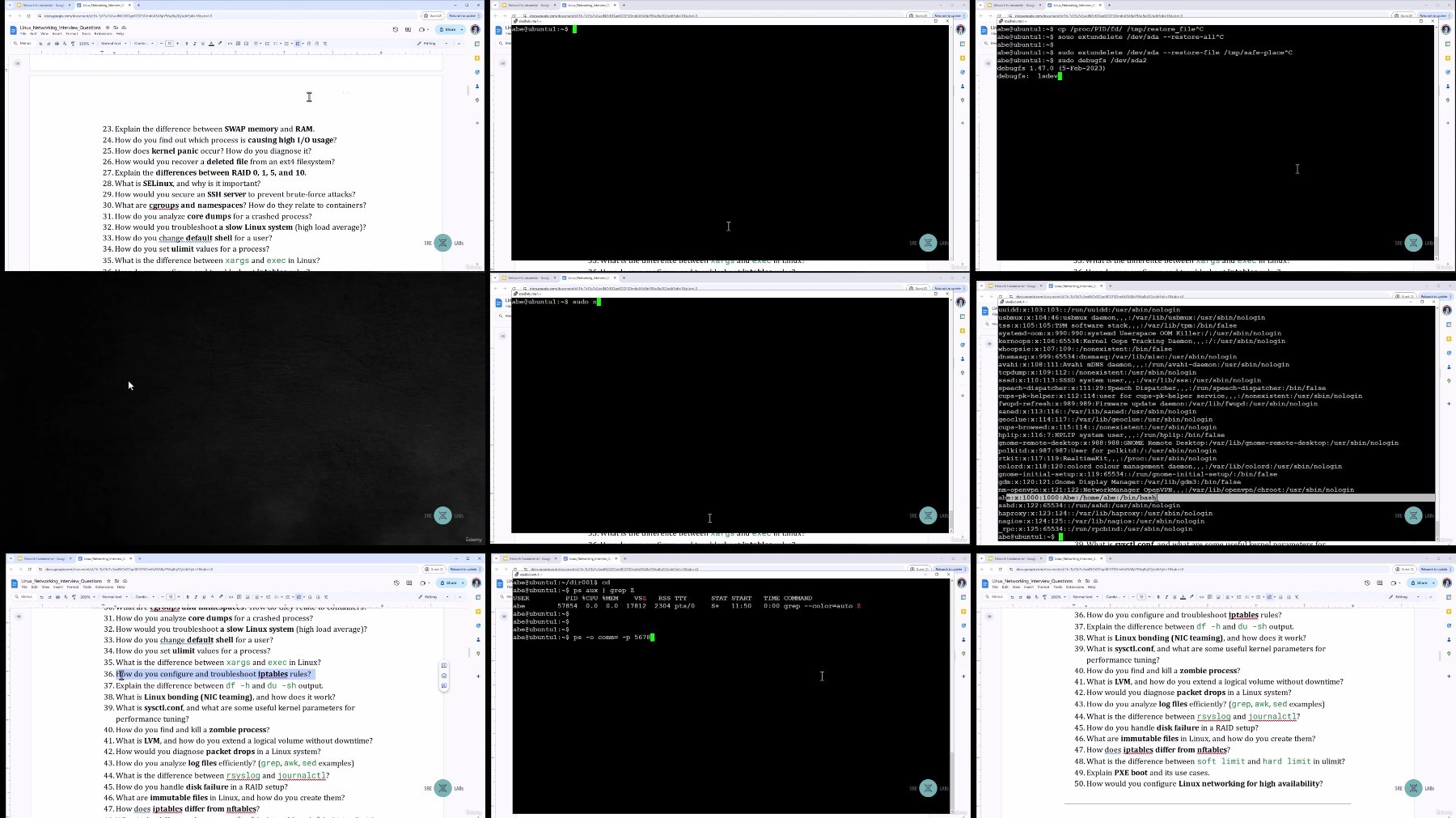
Master Linux Admin For Devops & Sre: Become Job-Ready
Published 3/2025
MP4 | Video: h264, 1920x1080 | Audio: AAC, 44.1 KHz
Language: English | Size: 14.81 GB | Duration: 25h 25m
Master Linux Admin for DevOps & SRE (2025) | Hands-On System Administration, Bash Scripting & Networking
[b]What you'll learn[/b]
Master Linux Administration - Learn essential Linux skills for system administration, including file management, user permissions, networking, and automation.
Prepare for DevOps & SRE Roles - Gain hands-on experience with Linux fundamentals required for Site Reliability Engineering (SRE) and DevOps careers.
Enhance Your Command-Line & Scripting Skills - Become proficient in Linux CLI commands, shell scripting, and process management to automate tasks efficiently.
Crush Your Tech Interviews - Get interview-ready with real-world Linux & Networking Q&A, troubleshooting exercises, and hands-on challenges designed to help you
Understand Linux Networking & Security - Learn how to configure network interfaces, firewalls, security settings, and troubleshoot system performance issues.
Optimize Linux for High Performance - Master resource management, ulimit, sysctl tuning, and system debugging to ensure maximum efficiency.
Become Job-Ready for SRE & DevOps - Get a strong foundation in Linux, Networking, and troubleshooting to land your first job or advance your career.
[b]Requirements[/b]
No prior Linux or DevOps experience is required! This course is designed for beginners and intermediate learners looking to master Linux for SRE, DevOps, and tech interviews.
A computer (Windows, macOS, or Linux) - You'll need a system where you can install and use Linux (or a virtual machine).
Basic computer skills - You should be comfortable using a computer, browsing the internet, and installing software.
A willingness to learn - This course is hands-on and practical, so come ready to practice, experiment, and improve your skills!
[b]Description[/b]
Master Linux Administration for DevOps & SRE (2025) - Become a Job-Ready EngineerLearn Linux System Administration, Bash Scripting, Networking, and Troubleshooting with Hands-On Labs.Are you ready to master Linux and launch your career in DevOps and SRE? This hands-on, job-focused course is designed to take you from beginner to pro in Linux system administration, equipping you with essential skills for high-paying DevOps and SRE roles in 2025.Why Learn Linux for DevOps and SRE?96% of cloud servers run on Linux - Linux is the foundation of DevOps and Cloud Computing.High demand for DevOps and SRE Engineers - Companies actively hire professionals with Linux expertise.Mastering Linux opens career opportunities - Whether you are a beginner or an IT professional, this course helps you stand out.What You Will LearnLinux System Administration - Master essential Linux commands and shell scripting.Bash Scripting and Automation - Automate tasks and improve efficiency.Networking and Security - Configure IPs, firewalls, DNS, and secure servers.Troubleshooting and Performance Tuning - Diagnose and resolve system issues.Cloud and DevOps Integration - Learn Linux in AWS, Docker, Kubernetes, and CI/CD pipelines.This course includes hands-on training, real-world scenarios, labs, and projects to reinforce learning.Who Is This Course For?Beginners - No prior Linux experience required.Aspiring DevOps and SRE Engineers - Build a strong Linux foundation for AWS, Docker, Kubernetes, and CI/CD.System Administrators and IT Professionals - Upgrade your skills and expand job opportunities.Cloud Engineers - Strengthen Linux knowledge for AWS, Azure, and Google Cloud.What Makes This Course Unique?Updated for 2025 - Learn the latest Linux and DevOps best practices.Hands-On Learning - Real-world labs, challenges, and exercises.Expert-Led Training - Taught by an experienced Linux and DevOps professional.Certificate of Completion - Showcase your Linux expertise to potential employers.Lifetime Access - Learn at your own pace with full course content available anytime.Ready to Master Linux and Advance Your Career?Enroll now and become a Linux Administrator, DevOps Engineer, or SRE professional in 2025. Gain the skills and confidence to succeed in this high-demand industry.Click "Enroll Now" and start your Linux journey today!
Overview
Section 1: Linux Fundamentals
Lecture 1 Introduction
Lecture 2 Linux Fundamentals: What You Need to Know
Lecture 3 The History of Linux: From Unix to Today
Lecture 4 How Linux is Used in the Real World
Lecture 5 The GNU Project & Open Source Revolution
Lecture 6 What Happens When You Press the Power Button?
Lecture 7 PID 1 & The First Process in Linux
Lecture 8 Parent & Child Processes: Who Runs What?
Lecture 9 Installing Linux: Step-by-Step Demo
Lecture 10 Setting Up Nginx on Linux: Quick Guide
Lecture 11 SysV Init Explained: The Old Startup System
Lecture 12 Text Mode vs. Graphical Mode in Linux
Lecture 13 Systemd vs. SysV Init: The Big Debate
Lecture 14 Mastering Systemd: Managing Services in Linux
Lecture 15 Hang in there!
Lecture 16 User Management in Linux: Adding & Controlling Users
Lecture 17 Linux Group Management: Organizing Users Effectively
Lecture 18 File Permissions in Linux: Who Can Access What?
Lecture 19 Ownership & Permissions: Securing Your Files
Lecture 20 Mastering sudo: Running Commands as Root
Lecture 21 Introduction to Linux Filesystems: How Data is Stored
Lecture 22 Partitions in Linux: Managing Disks Like a Pro
Lecture 23 Mounting Drives in Linux: How It Works
Lecture 24 Fstab & Permanent Mounting: Automating Drive Mounts
Lecture 25 Filesystem Hierarchy (FHS): Understanding Linux Directories
Lecture 26 Filesystem Hierarchy Part 2: What Goes Where?
Lecture 27 Filesystem Hierarchy Part 3: Deep Dive
Lecture 28 Understanding Swap Space: Memory Beyond RAM
Lecture 29 Monitoring Storage in Linux: Avoiding Disk Issues
Lecture 30 Filesystem Troubleshooting: Fixing Disk Errors
Lecture 31 Logical Volume Manager (LVM) Part 1: What It Is & Why It Matters
Lecture 32 LVM Part 2: Expanding & Managing Storage Dynamically
Lecture 33 Nice & Renice: Controlling Process Priorities
Lecture 34 Monitoring Processes with top & htop
Lecture 35 Killing Processes in Linux: When & How to Do It
Lecture 36 Advanced Process Debugging: Using strace & lsof
Lecture 37 Introduction to Shell Scripting: Automate Like a Pro
Lecture 38 Shell Scripting Part 2: Writing Your First Script
Lecture 39 Shell Variables: Storing & Using Data
Lecture 40 Understanding Conditionals in Shell Scripts
Lecture 41 Advanced If Statements & Logic in Shell Scripts
Lecture 42 Conditionals Part 3: Nested Conditions & Case Statements
Lecture 43 Introduction to Loops in Shell Scripts
Lecture 44 For Loops: Automating Repeated Tasks
Lecture 45 While Loops: When You Need Continuous Execution
Lecture 46 While Loops Part 2: More Examples & Use Cases
Lecture 47 While Loops Part 3 More Examples & Use Cases
Lecture 48 Mastering Automation Writing Shell Scripts for Everyday Tasks
Lecture 49 Cron Jobs Automating Repetitive Tasks
Lecture 50 Crontab vs. cron.d: What's the Difference?
Lecture 51 The at Command: One-Time Scheduled Tasks
Lecture 52 System Performance Tuning: The Essentials
Lecture 53 Performance Optimization Part 2: Advanced Techniques
Lecture 54 Monitoring CPU & Memory with top and free
Lecture 55 Understanding ulimit Preventing System Overload
Lecture 56 Ulimit Part 2: Practical Configurations
Lecture 57 Sysctl Explained: Tuning the Linux Kernel
Lecture 58 System Monitoring with sar & vmstat
Lecture 59 Troubleshooting System Performance: Finding Bottlenecks
Lecture 60 Linux Logs 101: Understanding System Logging
Lecture 61 Linux System Logging Part2
Lecture 62 Journalctl: Reading & Managing Systemd Logs
Lecture 63 Log Rotation: Keeping Log Files Under Control
Lecture 64 Best Practices for Managing Linux Logs
Lecture 65 Common Issues & Best Practices for Troubleshooting
Lecture 66 Using Ping, Traceroute, and Netstat for Network Debugging
Lecture 67 Syscalls & Their Role in Linux Performance
Lecture 68 Real-World Troubleshooting: Solving a Server Issue
Lecture 69 Great Job! Linux Chapter Complete - What's Next
Section 2: Network Fundamentals
Lecture 70 Networking 101: Introduction & The OSI Model
Lecture 71 IP Addressing & Subnetting Explained
Lecture 72 Public vs. Private IPs: What's the Difference?
Lecture 73 DNS Explained: How The Internet Finds Everything
Lecture 74 Firewalls & Ports: How Traffic is Secured
Lecture 75 Understanding iptables: Linux Firewall Basics
Lecture 76 Best Practices for Secure & Efficient Networking
Lecture 77 Network Configuration & Management: Getting Started
Lecture 78 ifconfig vs. ip Command: Managing Network Interfaces
Lecture 79 Default Gateway: How Traffic Leaves Your Network
Lecture 80 Static Routing: Directing Traffic Like a Pro
Lecture 81 Network Troubleshooting: Using Ping & Traceroute
Lecture 82 Traffic Analysis with tcpdump: Capturing Network Packets
Lecture 83 Wireshark Deep Dive: Visualizing Network Traffic
Lecture 84 iftop & nload: Monitoring Real-Time Network Traffic
Lecture 85 Networking Recap: Summary Before Load Balancing
Lecture 86 Introduction to Load Balancers & Reverse Proxies
Lecture 87 Layer 4 vs. Layer 7 Load Balancing: What's the Difference?
Lecture 88 HAProxy Part 1: Load Balancing Basics
Lecture 89 HAProxy Part 2: Advanced Configurations
Lecture 90 Load Balancing Strategies: Choosing The Right One
Lecture 91 Round Robin Load Balancing: How It Works
Lecture 92 Least Connections Load Balancing: Why It's Efficient
Lecture 93 Weighted Round Robin: Customizing Load Distribution
Lecture 94 Weighted Least Connections: Smarter Traffic Routing
Lecture 95 IP Hash Load Balancing: Keeping Sessions Consistent
Lecture 96 Least Response Time: The Fastest Server Wins
Lecture 97 Random Load Balancing: When Simplicity Works
Lecture 98 Least Bandwidth: Directing Traffic Based on Usage
Lecture 99 Reverse Proxy Explained: How It Optimizes & Secures Traffic
Lecture 100 Nginx as a Reverse Proxy: Setup & Best Practices
Lecture 101 Reverse Proxy Hands-On: Nginx Assignment
Lecture 102 Load Balancing & Reverse Proxy Summary
Lecture 103 VPN 101: What It Is & Why You Need One
Lecture 104 VPN Protocols: Which One Is Right for You?
Lecture 105 VPN Best Practices: Securing Your Connection
Lecture 106 Hardware VPNs: When You Need More Than Software
Lecture 107 High Availability Networking: Keeping Systems Online
Lecture 108 Bonding Modes: Network Redundancy & Speed Boost
Lecture 109 NIC Teaming: Combining Interfaces for Performance
Lecture 110 Network Bonding Demo: How It Works
Lecture 111 Network Bonding Demo Part 2: Advanced Config
Lecture 112 NIC Teaming Demo: Hands-On Walkthrough
Lecture 113 Network Failover & High Availability Wrap-Up
Lecture 114 Keepalived Explained: Ensuring Failover & Redundancy
Lecture 115 Keepalived Hands-On Demo
Lecture 116 Keepalived Wrap-Up: Final Thoughts on HA
Lecture 117 Network Monitoring Tools
Lecture 118 Cloud Networking Essentials: Introduction
Lecture 119 VPC Part 1: Understanding Virtual Private Clouds
Lecture 120 VPC Part 2: Subnets, Gateways & Security
Lecture 121 Networking in the Cloud: How It Works
Section 3: Interview Prep
Lecture 122 Interview Prep 101 Why These Questions Matter
Lecture 123 Linux Interview Warm-Up Must-Know Basics!
Lecture 124 Linux Interview Challenge Intermediate-Level Questions
Lecture 125 Ace Your Linux Interview Advanced Questions & Scenarios
Lecture 126 Networking Interview Kickstart Essential Basics
Lecture 127 Think Like an Engineer Intermediate Networking Questions
Lecture 128 Advanced Networking Questions - Part 1 Can You Solve These
Lecture 129 Advanced Networking Questions - Part 2 The Toughest Scenarios!
Lecture 130 You Did It. Time to Shine!
Aspiring DevOps Engineers & SREs - If you're looking to break into DevOps, Site Reliability Engineering (SRE), or Cloud Engineering, this course gives you a solid Linux foundation to get started.,Beginners in Linux & System Administration - If you're new to Linux but want to master the command line, administration, and networking, this course makes learning easy and hands-on.,Developers & IT Professionals - If you're a developer, system admin, or IT specialist looking to upgrade your Linux skills for career growth, this course helps you build real-world expertise.,Job Seekers Preparing for Interviews - If you're applying for DevOps, SRE, or Linux-related roles, this course covers essential Linux & Networking interview questions to help you stand out and get hired.,Students & Self-Learners - If you're passionate about technology, cloud computing, or automation, this course gives you a strong foundation to build upon.

AusFile
https://ausfile.com/ioaut7n3ajag/.Master.Linux.Admin.for.DevOps..SRE.Become.Job-Ready.-.Abe.Bazouie.Mar.2025.rar
- Подпись автора
www.prizrak.ws Аниме Форум. Софт, игры, фильмы, музыка, anime скачать бесплатно ^_^

